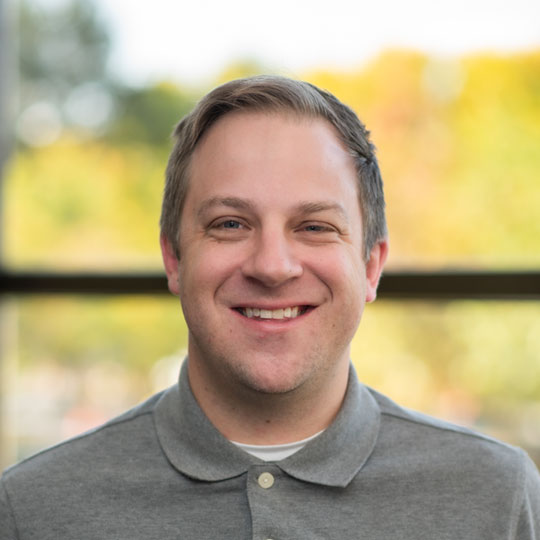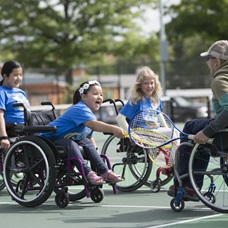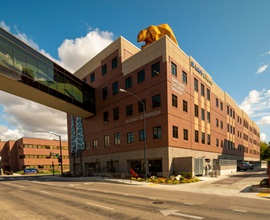Better Together
At St. Luke’s, a school unlike any other lets pediatric patients learn and still be kids

“Wait, that’s a real job?”
Sunday Twilegar’s reaction was not terribly different from her colleagues, Colin Carr and Kris Paulson, when learning about St. Luke’s Children’s Hospital School.
All three serve as teachers, helping patients keep up with their academics while receiving treatment and be ready to return to school.
“I’m prideful about it. The difference we get to make with kids is unlike anything else. It’s always positive here,” Twilegar said. “… I’m focusing on enriching educational activities, have a positive experience wanting them to go to school every day.
“You get sad when they’re leaving but so happy to see them go because it’s such a joy to see them get better and go home.”
The Children’s teachers are all Idaho-certified in special education and maintain the same accreditation requirements as teachers in the Boise Public School District.
And getting kids eager to go back to school is a major piece of working with the elementary-aged students, too — even getting their classmates excited can be part of the job.
At the epicenter of the school is a classroom in the Idaho Elks Children’s Pavilion across the street from the hospital, connected by a skybridge. Most of the learning occurs in the classroom, but Twilegar and Carr also will do some bedside instruction or at St. Luke’s clinics.
“It’s such a unique, rewarding job — there’s really nothing that can prepare you for it,” said Carr, who has worked as a teacher at St. Luke’s for nearly 12 years. “It certainly can be difficult, considering what these kids go through, but just being around them, having them look forward to some normalcy, it is special.”
Paulson primarily works with kids between the ages of 12 and 17 as part of St. Luke’s pediatric partial hospitalization program, which helps kids facing serious issues like depression, self-harm or other behavioral concerns.
At the nearby St. Luke’s Children’s Center for Neurobehavioral Medicine, she aims to create a welcoming environment that sparks interest in any sort of subject — artwork adorns the walls, music plays, STEM kits and models abound for exploration.
Paulson previously worked in special and elementary education before spending 15 years as a middle school counselor, joining St. Luke’s in 2020. A significant focus is integrating ways to help her students advocate for themselves, set boundaries at school or grow executive function skills.
“This is an environment that really cares about kids and puts the kids first,” Paulson said. “It’s a win if I can reignite those interests … I love how it’s different every day. It challenges me, and I learn a lot from the people I work with — therapists, mental health specialists, psychiatrists.
“I’m constantly engaged and challenged. Working with these kids, it’s the perfect job for what I enjoy doing in so many ways.”
Working with an older group, Paulson also helps find ways for her students to find other educational opportunities, if necessary, such as finding a new school or a charter school or setting them up with ways to earn their GED.
Recently, Carr and Twilegar traveled to northern Nevada to visit a current patient’s classroom back home. They set up a video call so he could say hi to his class, while the teachers explained to the kids what he was going through at Children’s. A stuffed monkey currently occupies his desk, and classmates will take the monkey around the school to different events and take photos, knowing they are thinking of him.
“For kids in oncology, research shows that sense of normalcy gives a better chance of survival even in this abnormal chaos,” Twilegar said. “School is such a big part of their lives; it helps with that process, emotionally, to not just have school here but to look forward to going back to their regular class.”
Patients don’t attend class as long as they would on a typical school day, instead having a focused hour on learning in the classroom, with perhaps some work they can do in their rooms. There is a focus on the basics, especially math and reading, but there is also an effort to just make it fun.
A big part of that is a little outside help.
Partner programs, notably Zoo Boise, Idaho Shakespeare Festival and Boise Rock School, make weekly visits.
Zoo Boise may bring in backpacks with activities like bird-identifying kits or animal skulls and furs. Idaho Shakespeare Festival lets kids take part in acting exercises — they are currently reading Shakespeare’s “As You Like It” — with patients and nurses and teachers alike invited to a live performance this summer. Boise Rock School brings in instruments and shows kids how to make songs using programs like Garage Band.
“The whole floor comes alive when they visit,” Twilegar said.
Since Jan. 1, those visitors, after nearly three years, are now able to return in-person after helping out via Zoom during the COVID-19 pandemic. That has been a big benefit, as has the simple ability of the kids to be in class with one another, which wasn’t always possible since this time of year in 2020.
“It’s been rejuvenating,” Carr said. “They didn’t have some of those personal interactions. It just wasn’t the same. Now, we can have more than one kid in the classroom, the interaction with them and each other, knowing they’re not alone is amazing.”About The Author

Dave Southorn works in the Communications and Marketing department at St. Luke's.




